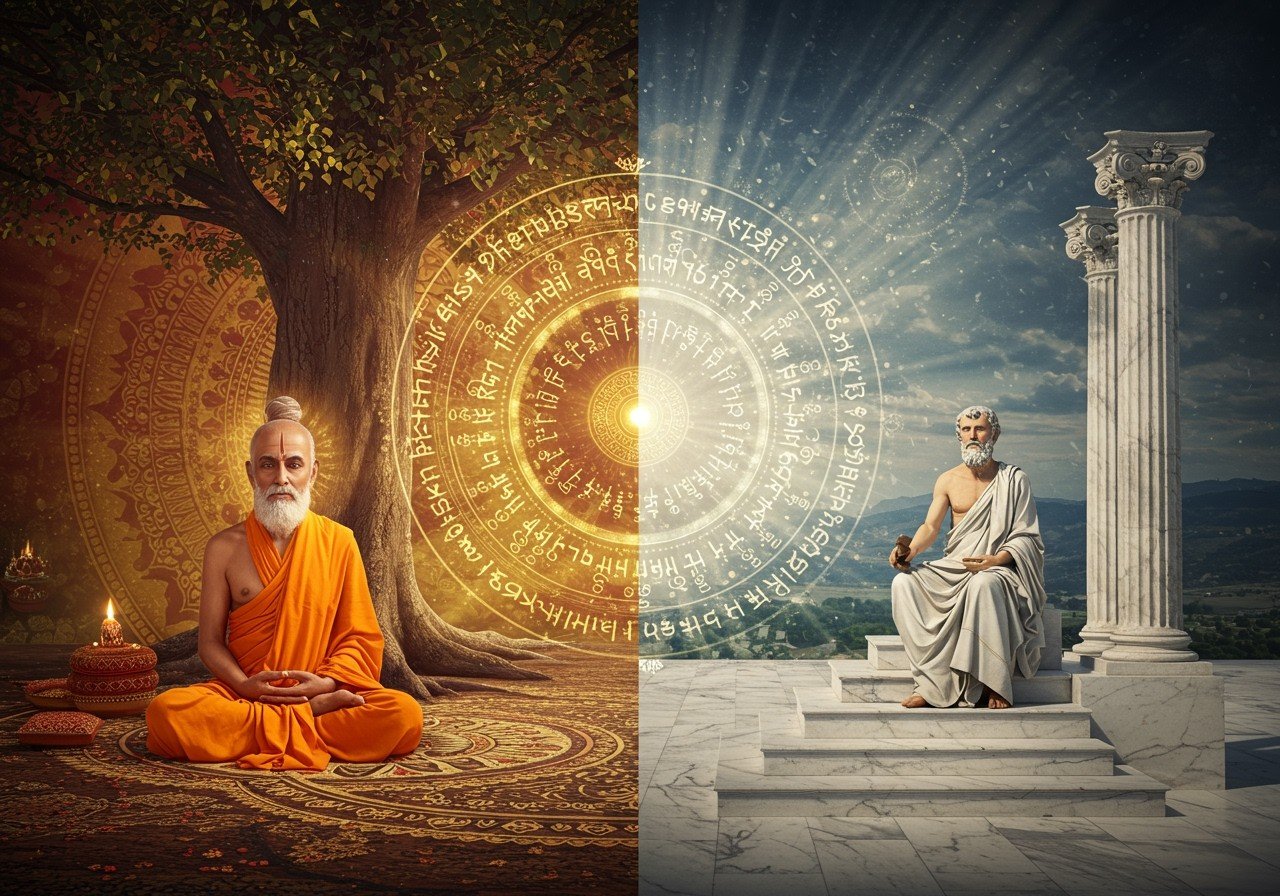
Indian philosophy and Western philosophy represent two distinct and profound systems of thought. Indian philosophy, deeply rooted in spirituality and metaphysics, stands in contrast to the empirical and analytical approach of Western philosophy. Understanding these differences provides valuable insights into how cultures shape intellectual frameworks. This article delves into the key distinctions, historical contexts, and core tenets that differentiate these traditions, focusing particularly on Greek philosophy.
Historical Context
Indian philosophy originates from the ancient Vedic texts (circa 1500 BCE) and the Upanishads, which emphasize spiritual knowledge and concepts like Brahman (ultimate reality) and Atman (individual soul). Western philosophy, particularly the Greek tradition, emerged around 600 BCE with thinkers like Socrates, Plato, and Aristotle, who prioritized rationality, ethics, and political theory. The historical and cultural settings have profoundly influenced the direction and focus of each tradition.
- Indian Philosophy:
- Vedic Texts: Centered on rituals, hymns, and the foundations of religious practices. These texts laid the groundwork for later philosophical developments.
- Upanishads: Emphasized spiritual knowledge, self-realization, and the nature of reality. They explored the relationship between the individual self and the ultimate reality.
- Key Figures: Shankara (788-820 CE), a prominent figure in Advaita Vedanta, systematized the non-dualistic understanding of reality.
- Western Philosophy:
- Greek Philosophers: Socrates, Plato, and Aristotle laid the foundations of Western philosophical inquiry, focusing on logic, ethics, and metaphysics. Their works shaped subsequent Western thought.
- Written Dialogues: Utilized written dialogues and treatises to explore complex philosophical issues, providing detailed arguments and analyses.
- Key Figures: Aristotle (384-322 BCE) made significant contributions to various fields, including metaphysics, ethics, logic, and politics, influencing Western thought for centuries.
Oral Traditions vs. Written Dialogues
Indian philosophy often relied on oral traditions passed down through generations of teachers and students. This oral transmission contributed to the fluidity and evolving nature of philosophical concepts. In contrast, Western philosophy heavily utilized written dialogues and treatises, allowing for precise articulation and preservation of ideas. This difference in transmission significantly impacted how philosophical concepts were disseminated and interpreted.
Core Philosophical Concepts
Indian philosophy centers on concepts like Dharma (duty/ethics), Karma (action and consequences), and Moksha (liberation/salvation). These concepts are deeply intertwined with spiritual practice and the pursuit of self-realization. Western philosophy often focuses on logic, epistemology (study of knowledge), and metaphysics, exploring the nature of reality and the limits of human understanding.
- Indian Philosophy:
- Dharma: Ethical duties and responsibilities, guiding individuals towards righteous conduct and harmonious living.
- Karma: The principle of cause and effect, where actions have consequences that shape future experiences and rebirths.
- Moksha: Spiritual liberation from the cycle of birth and death, achieved through self-realization and the transcendence of ego.
- Western Philosophy:
- Logic: Rational thinking and reasoning, emphasizing clear and valid arguments to arrive at sound conclusions.
- Epistemology: The study of knowledge, exploring its nature, sources, and limits. It seeks to understand how we acquire and justify knowledge claims.
- Metaphysics: The study of reality, examining fundamental questions about existence, being, and the nature of the universe.
Non-Dualism vs. Dualism
Indian philosophy frequently explores non-dualism (Advaita), a perspective that sees no ultimate separation between the individual self (Atman) and the ultimate reality (Brahman). This interconnectedness is a core principle in many Indian philosophical schools. Western thought typically embraces dualism, separating mind and body, self and other. This distinction influences how each tradition understands the nature of consciousness and reality.
Epistemology and Methodology
Indian philosophy employs various methods for acquiring knowledge, including Pratyaksha (perception), Anumana (inference), and Shabda (testimony). Western philosophy, especially the Greek tradition, emphasizes rationalism and empiricism as primary means of acquiring knowledge.
- Indian Methods:
- Pratyaksha: Direct perception through the senses, considered a valid source of knowledge but subject to limitations.
- Anumana: Logical inference and reasoning, used to derive knowledge from existing observations and established principles.
- Shabda: Reliable testimony from sacred texts (Vedas, Upanishads) or wise individuals (gurus), considered a crucial source of spiritual and philosophical knowledge.
- Western Methods:
- Rationalism: Emphasizes reason and logical analysis as the primary tools for acquiring knowledge. It values deductive reasoning and a priori knowledge.
- Empiricism: Prioritizes sensory experience and observation as the foundation of knowledge. It emphasizes inductive reasoning and a posteriori knowledge.
Intuition vs. Analytical Reasoning
Intuition and direct experience hold significant weight in Indian philosophy, particularly in understanding spiritual truths. Western philosophy often prioritizes analytical reasoning, deductive logic, and empirical evidence as the primary means of acquiring and validating knowledge.
Ethics and Morality
In Indian philosophy, ethics are intertwined with spiritual principles and the concept of Dharma. Fulfilling one’s Dharma is seen as a path to spiritual growth. Western philosophy emphasizes various ethical frameworks, including virtue ethics, deontology, and utilitarianism, focusing on the development of a moral character and creating a just society.
- Indian Ethics:
- Dharma: Ethical duties and responsibilities based on one’s role in society and stage of life, guiding individuals towards righteous conduct.
- Nishkama Karma: Selfless action without attachment to results, performed as a duty without expecting rewards, promoting spiritual growth.
- Ahimsa: The principle of non-violence, extending compassion and respect to all living beings, a cornerstone of ethical conduct.
- Western Ethics:
- Virtue Ethics: Focuses on cultivating virtuous character traits, such as courage, justice, and wisdom, as the basis for ethical decision-making.
- Eudaimonia: Flourishing and living a fulfilling life by cultivating virtues and living in accordance with reason.
- Just War Theory: Examines the ethical principles governing warfare, seeking to define justifiable reasons for war and acceptable conduct during conflict.
Metaphysical Views
Indian philosophy’s metaphysical views often include the concepts of reincarnation (samsara) and the pursuit of liberation (moksha). Western metaphysics explores the nature of being, the existence of the soul, and the relationship between mind and matter.
- Indian Metaphysics:
- Brahman: The ultimate reality, the impersonal, divine ground of all existence, often described as pure consciousness or being.
- Samsara: The cycle of birth, death, and rebirth, driven by karma, from which liberation (moksha) is sought.
- Atman: The individual soul or self, believed to be ultimately identical with Brahman in some schools of thought.
- Western Metaphysics:
- Theory of Forms: Plato’s theory positing the existence of eternal and perfect forms or ideals, which are the true objects of knowledge.
- Nature of Being: Aristotle’s exploration of substance, essence, and the categories of being, laying the groundwork for Western ontology.
- Soul Concept: Varied interpretations of the soul, ranging from an immortal and immaterial entity to a mortal aspect of the body.
Cyclic vs. Linear Perspectives
Indian philosophy often views time as cyclic, with endless cycles of creation and destruction. Western thought generally perceives time as a linear progression from past to future.
Philosophical Schools
Indian philosophy encompasses various schools of thought, including Vedanta, Yoga, Nyaya, and Samkhya. Western philosophy includes schools such as Stoicism, Epicureanism, and Skepticism.
- Indian Schools:
- Vedanta: Focuses on the Upanishads and the concept of Brahman, emphasizing self-realization and the unity of Atman and Brahman.
- Yoga: A practical philosophy emphasizing physical and mental disciplines to achieve spiritual liberation and union with the divine.
- Nyaya: A school of logic and epistemology, focusing on methods of knowledge acquisition and valid reasoning.
- Samkhya: A dualistic philosophy distinguishing between matter (prakriti) and consciousness (purusha), exploring their interaction and the path to liberation.
- Western Schools:
- Stoicism: Emphasizes virtue, reason, and living in harmony with nature, focusing on self-control and acceptance of fate.
- Epicureanism: Advocates for the pursuit of pleasure and the avoidance of pain as the highest good, emphasizing a simple and tranquil life.
- Skepticism: Questions the possibility of certain knowledge, emphasizing doubt and the limitations of human understanding.
Influence on Contemporary Thought
Both Indian and Western philosophical traditions continue to influence modern thought, spirituality, ethics, and practices. Indian philosophical schools often integrate religious elements, while Western schools tend to be more secular. Their impact can be seen in various fields, from psychology and self-help to ethics and social justice movements.
Conclusion
Indian and Western philosophies offer unique and insightful perspectives on fundamental questions about life, knowledge, and ethics. Indian philosophy, with its focus on spirituality and metaphysics, emphasizes concepts like Dharma, Karma, and Moksha, often viewing time as cyclic and the self as interconnected with the universe. Western philosophy, particularly the Greek tradition, prioritizes rationality, logic, and empirical evidence, with a linear view of time and a dualistic approach to mind and body. By understanding these differences, we gain a deeper appreciation for the diversity of human thought and the various paths towards understanding existence and morality. Both traditions have made profound contributions to global intellectual history, enriching our collective understanding of ourselves and the world around us.
FAQs on Indian Philosophy vs. Western Philosophy: A Core Comparison
What are the main differences between Indian and Western philosophy? Indian philosophy often focuses on spiritual growth and self-realization, while Western philosophy tends to emphasize logic, science, and empirical evidence. These different orientations shape their approaches to knowledge, ethics, and the nature of reality.
How does Indian philosophy approach the concept of God? Indian philosophy encompasses a wide range of views on God, from monotheism to atheism and pantheism. It often focuses on the divine within oneself and the interconnectedness of all beings. Western philosophy typically debates the existence and nature of a singular, transcendent God.
What role does meditation play in Indian philosophy? Meditation is a central practice in many Indian philosophical schools, used as a tool for achieving spiritual enlightenment, self-awareness, and inner peace. Western philosophy generally does not place as much emphasis on meditation, focusing more on rational thought and analysis.
How does morality differ in Indian philosophy vs Western philosophy? Indian philosophy often links morality to concepts like karma and dharma, emphasizing the ethical consequences of actions and the importance of fulfilling one’s duties. Western philosophy explores morality through various ethical theories, such as utilitarianism, deontology, and virtue ethics, often focusing on universal principles and individual rights.
Is there a difference in how Indian and Western philosophies view the self? Yes, Indian philosophy often views the self as interconnected with the universe, sometimes seeing the individual self (Atman) as ultimately identical with the ultimate reality (Brahman). Western philosophy typically views the self as a distinct and individual entity, emphasizing personal identity and consciousness.
What are the similarities between Indian and Greek philosophy? Both Indian and Greek philosophies grapple with fundamental questions about existence, knowledge, and ethics. They both explore the nature of reality, the good life, and the pursuit of wisdom. However, they differ significantly in their methodologies and emphasis on spiritual vs. rational approaches.
How do Indian and Western philosophies address the concept of knowledge? Indian philosophy often views knowledge as a means to spiritual awakening, emphasizing intuition, inner wisdom, and the authority of sacred texts. Western philosophy primarily focuses on empirical evidence, logical reasoning, and critical inquiry as sources of knowledge.
Why is Indian philosophy less known in the Western world? Historical, cultural, and educational biases have contributed to the relative obscurity of Indian philosophy in the West. However, interest in Indian philosophy is growing as people seek alternative perspectives and explore different spiritual and philosophical traditions.
How Poojn.in Supports Your Philosophical Journey
Poojn.in, India’s leading online store for cultural and spiritual goods, offers a wide selection of items to enhance your exploration of Indian philosophy and spiritual practices. Whether you are studying ancient texts, practicing meditation, or performing rituals, Poojn.in provides authentic and high-quality products to support your journey.
- For Meditation and Spiritual Practices:
- Meditation Bowls: Discover our pure copper and brass meditation bowls to create serene soundscapes for deeper meditation experiences. These bowls are handcrafted with precision and produce resonant tones that promote relaxation and focus.
- Meditation Mats (Asanas): Find traditional meditation mats (asanas) made from natural materials like kusha grass, providing comfortable and supportive seating for your practice.
- Rudraksha Malas: Explore our collection of authentic rudraksha malas, traditionally used for japa meditation and counting mantras. These malas are made with genuine rudraksha beads and come in various sizes and styles.
- For Vedic Practices and Rituals:
- Oil Lamps (Diyas): Illuminate your sacred space with pure silver and brass oil lamps (diyas), traditionally used in puja and ceremonies. These diyas add a touch of sacred ambiance to your rituals.
- Puja Sets: Simplify your daily rituals with our complete puja sets, containing all the essential items for performing traditional ceremonies. Our puja sets are thoughtfully curated to ensure authenticity and convenience.
- Sacred Texts and Scriptures: Delve deeper into the wisdom of Indian philosophy with our collection of sacred texts and scriptures, including the Vedas, Upanishads, and other important philosophical works.
Visit Poojn.in today to explore our complete collection and find the perfect items to support your philosophical and spiritual journey. We offer pan-India delivery, bringing the richness of Indian tradition to your doorstep.


